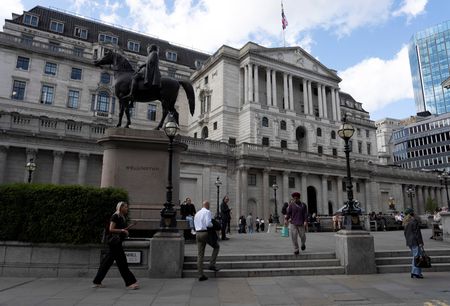By David Milliken
LONDON (Reuters) -The Bank of England could soon announce an end to the sale of most of the long-dated gilts it holds in an effort to soothe the government bond market and reduce taxpayer losses from its quantitative easing programme, a former policymaker said.
Michael Saunders, who served on the BoE’s Monetary Policy Committee from 2016 to 2022 and is now a senior advisor to Oxford Economics, expected the BoE to slow the annual pace of bond holding reductions to 75-80 billion pounds from 100 billion pounds ($134 billion) now.
The BoE began lowering its bond holdings in late 2022 and is due to set out a latest sale plan in September. Unusually among central banks, the BoE actively sells gilts as well as refraining from reinvesting the proceeds of gilts that mature.
A recent BoE survey showed market participants on average expected a cut in annual sales of gilts to 75 billion pounds.
“The BoE will no doubt worry that an upside surprise in QT (quantitative tightening) or a return to sizeable active sales of long gilts might cause significant further upward pressure on gilt yields,” Saunders wrote in a note to clients on Tuesday.
“Such an outcome potentially could worsen the government’s finances, create wider financial instability or damage the economy.”
Saunders said the BoE might also announce it would keep roughly three quarters of its holdings of gilts with a maturity of 20 years or longer which have a face value of 126 billion pounds.
Like in other countries, long-dated gilts have been sold heavily in the past 12 months, pushing 30-year British government bond yields to a post-1998 high in April, prompting the BoE to postpone an auction of long-dated gilts.
Similar to the Bank of Canada, the BoE might hold most of its long-dated bonds until maturity to balance liabilities from the stock of banknotes and coins in issue, Saunders said.
That would crystallise a 27 billion-pound loss, but the 1.2 billion-pound annual cost of financing that would be less than the 2.5 billion pounds in interest the BoE would receive, he estimated.
“The advantage of announcing the shift this year would be to reduce uncertainty over the future programme for QT and active sales, which may help ease gilt market strains,” Saunders said.
Governor Andrew Bailey has said the BoE will take market moves over the past year into account.
($1 = 0.7474 pounds)
(Writing by William Schomberg; Editing by Alexandra Hudson)











